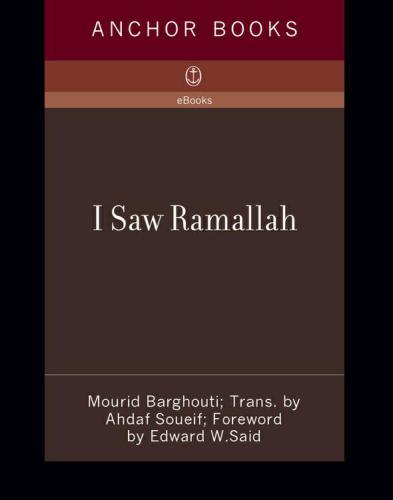
I Saw Ramallah
کتاب های مرتبط
- اطلاعات
- نقد و بررسی
- دیدگاه کاربران
نقد و بررسی

April 7, 2003
You can never go home again. That's the message in this impressionistic memoir by a Palestinian poet returning to the West Bank after 30 years of exile. Barghouti was in Cairo at the university when Israel won the Six-Day War and didn't return home until 1996, when the now-defunct Oslo Accords allowed him to go back. As one might expect, his return to see his birthplace and his family is fraught with problems, as he attempts to reconnect with relatives and friends. The people living in Ramallah and its physical geography have changed in ways that make Barghouti feel as displaced at home as he does abroad. The changes he blames partly on the weakness of his own people, but mostly on the Israelis. The truth of Palestinian faults "does not absolve the enemy of his original crime...." Indeed, the anger he feels at Israelis on both the left and the right helps explain why the Oslo peace process failed and why peace seems as elusive as ever. But this is as much a personal journey as a political one. Using a poet's eye for detail and language (the book is beautifully translated), Barghouti, who now lives in Cairo, intersperses the story of his homecoming with his history of journeys across the Arab world. "The displaced person becomes a stranger to his memories and so he tries to cling to them." His deft mind and words show how, for many Palestinians, politics have swallowed up the personal.

Starred review from May 1, 2003
Of the many books written in the past few decades about the plight of the Palestinians, this one is unique in that the author, a well-known Palestinian poet, brings to life the pain and suffering of exiles in a way that few books in English have been able to do. When the book first appeared in Arabic in 1997, it received universal praise in the Arab world and eventually won the prestigious Naguib Mahfouz Medal for Literature. As a student at Cairo University, the author found himself barred from returning home after the 1967 Arab-Israeli War and the occupation of the West Bank by the Israeli military. When Barghouti (who now lives in Cairo) was finally allowed to return for a brief visit to his homeland in the summer of 1996, he experienced the mix of emotions that define the life of any exile, ranging from joy to sadness to anger. The author's extraordinary ability to express his feelings, and by implication those of other Palestinians, in moving essays is what makes this book such an eloquent account of Palestinian existence today. Highly recommended for all public and academic libraries.-Nader Entessar, Spring Hill Coll., Mobile, AL
Copyright 2003 Library Journal, LLC Used with permission.

April 15, 2003
Poet Barghouti puts a personal face on the plight of displaced Palestinians in this account that is as much politically tinged lament as memoir. Thirty years--and nine volumes of verse--after being deported from his home in Cairo, he was permitted to return to the home of his youth on the West Bank in 1997. "Displacement is like death," he states. "One thinks it happens only to other people." Yet he describes himself as just one of four million displaced Palestinians who have no airline, police, TV, or government. Several months after the Six Days War, when his son was just five months old, Barghouti was taken for "preventative deportation" and separated from his family for most of the next 17 years before being allowed back in Egypt. He targets Anwar Sadat, responsible for the deportation that deprived him of having other children, and various Israeli leaders, who headed the occupation he calls a crime. Interspersed vignettes portraying the author's life are often charming but sometimes confusing in terms of chronology and emphasis--only at midbook is his deportation detailed, and even then it's not fully explained--and repetition dulls the message. Still, this relentless account, first published in 1997 in the Arab world, reflects the acuity and sensitivity of a poet (with an occasional verse included) and provides an underrepresented point of view.(Reprinted with permission of Booklist, copyright 2003, American Library Association.)

























دیدگاه کاربران